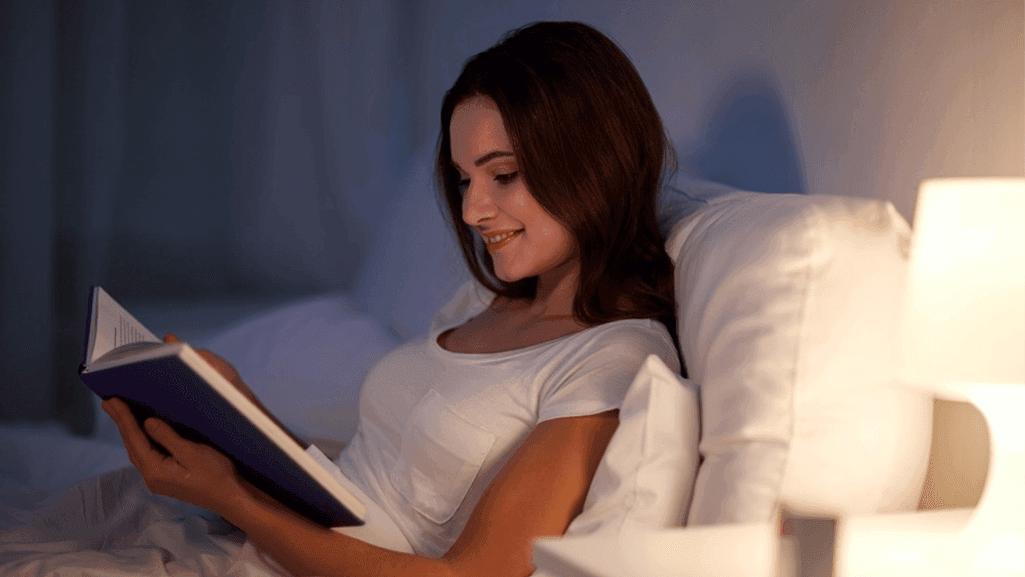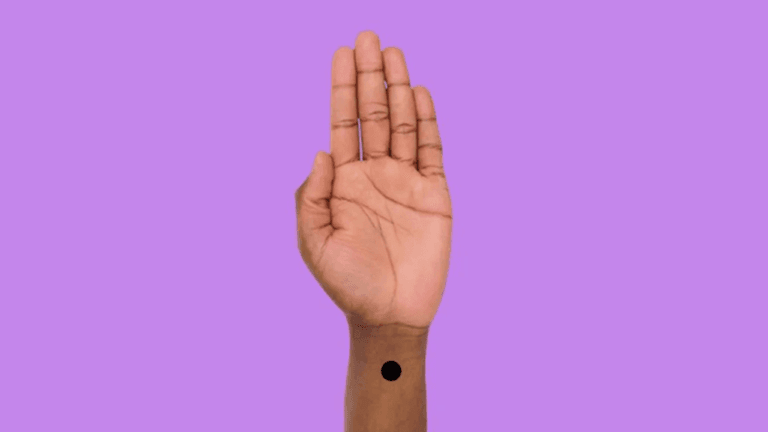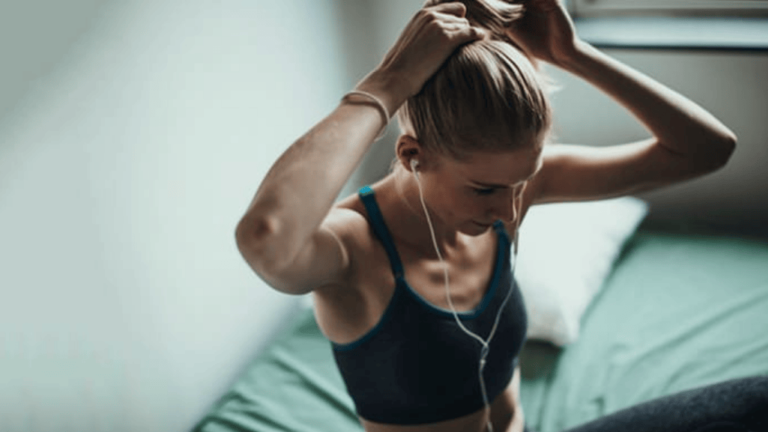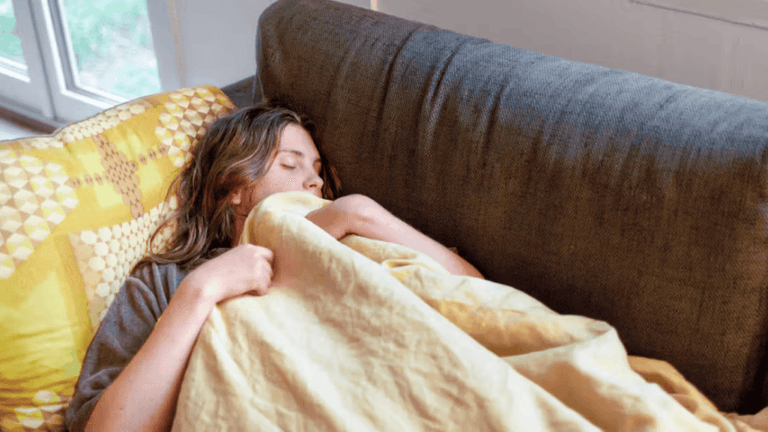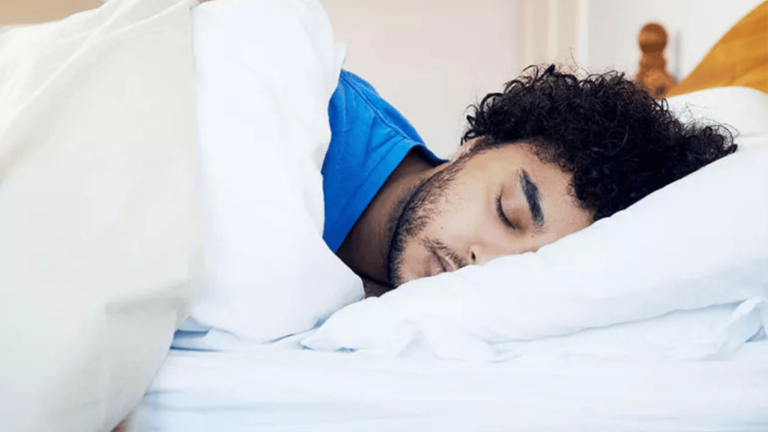Getting ready for a good night’s sleep is key for your health. A consistent bedtime routine with calming activities can make a big difference. By setting up a sleep-friendly space and following pre-sleep habits, you’ll wake up feeling great.
A study found that 60% of Americans sleep with their phones nearby, which can mess with their sleep. The average bedtime is 11:39 p.m., but experts say to eat dinner two to three hours before bed. This helps avoid digestive problems that can keep you awake.
Also, caffeine can affect you for up to 12 hours. So, it’s wise to avoid it a few hours before bed.
To sleep better, try setting an alarm for bedtime. Doing relaxing things like taking a warm bath or listening to soothing music can help you fall asleep faster. Stretching and other calming exercises also prepare your body and mind for sleep. Make sure your bedroom is cool and has comfy bedding.
Key Takeaways
- Establish a consistent bedtime routine with wind-down activities and nighttime rituals
- Avoid using electronic devices at least one to two hours before bed
- Refrain from consuming stimulants like caffeine and alcohol several hours before bedtime
- Engage in relaxing activities such as taking a warm bath or practicing meditation
- Maintain a comfortable sleeping environment with a cool temperature and quality bedding
Create a Relaxing Bedtime Routine
Creating a bedtime routine is key for a good sleep schedule and better sleep habits. Sleep scientist Rebecca Robbins says making bedtime rituals can prepare us for sleep. Not sticking to a bedtime routine is a big mistake for adults, leading to sleep problems and health issues.
Establish a Consistent Sleep Schedule
Medical doctor and sleep expert Chris Winter suggests waking up at the same time each day. This helps set your body’s clock for better sleep at night. Having a regular bedtime routine is good for your health, including your heart and mind.
Engage in Calming Activities
Calming activities before bed get your body and mind ready for sleep. Some good ones include:
- Reading a book
- Listening to soothing music
- Taking a warm bath
- Journaling to organize thoughts
- Creating a to-do list for the next day
Robbins advises charging your phone, turning off notifications, and avoiding screens 30 minutes before bed. This helps keep your sleep peaceful. Blue light from screens can mess with your sleep patterns and quality.
Practice Relaxation Techniques
Adding relaxation techniques to your bedtime routine can ease tension and help you sleep. Some good ones are:
- Deep breathing exercises
- Progressive muscle relaxation
- Yoga
- Meditation
- Aromatherapy with relaxing scents
Practicing self-compassion is important in achieving good sleep, according to sleep specialist Chris Winter.
Starting your bedtime routine two to three hours before bed is best. Doing activities before bed outside your bedroom keeps it just for sleep. This helps with better sleep hygiene.
Optimize Your Sleep Environment
Creating a cozy and calm sleep environment is key for a good night’s sleep. Focus on bedroom temperature, light and noise, and comfy bedding. These factors can greatly boost your sleep quality and health.
Set the Right Temperature
The Sleep Foundation suggests a room temperature of 65°F (18°C) for better sleep. This helps your body naturally cool down, leading to deeper sleep. Keep your thermostat between 65°F and 70°F (18°C and 21°C) to avoid disrupting sleep.
Minimize Light and Noise
Light and noise can mess with your sleep. Use blackout curtains or a sleep mask to keep it dark. For noise, try earplugs or a white noise machine. Studies show that constant noise can harm sleep and health over time.
Ensure a Comfortable Sleeping Surface
A good mattress, pillows, and bedding are vital for sleep. Pick a mattress that supports your body well. Choose pillows based on how you sleep. There are many bed sheets for all budgets, from light for hot sleepers to flannel for cold climates.
“Only about half of Americans wake up feeling well-rested.”
Keeping your bedroom clean and tidy also helps. Wash sheets every two weeks and pillowcases weekly. This keeps your space clean and improves sleep. Some smells, like lavender, can even help you relax and sleep better.
Avoid Sleep Disruptors Before to Sleep
Getting a good night’s sleep is key for health and happiness. But, many things can mess with your sleep. By avoiding these disruptors, you can sleep better and wake up feeling great.
Limit Screen Time
Blue light from screens like phones and computers is a big sleep killer. Blue light stops your body from making sleep. Try to stay away from screens for at least two hours before bed.
Avoid Caffeine and Alcohol
Caffeine and alcohol can mess with your sleep too. Caffeine stays in your system for hours, making it hard to sleep. Alcohol might make you feel sleepy at first but can mess up your sleep later. Try to cut down on caffeine and alcohol, mainly in the evening.
Refrain from Late-Night Meals
Eating big meals before bed can cause stomach problems. Late-night eating can also mess with your body’s natural sleep. Eat your last meal two to three hours before bed. If you’re hungry, have a light snack.
“Numerous medications, as identified in a 2020 study, have insomnia as a potential side effect.” – Samina Ahmed Jauregui, Sleep Psychologist
By cutting down on screens, avoiding caffeine and alcohol, and not eating too late, you can sleep better. Making these small changes can help you sleep more soundly and feel better overall.
Practice Mindfulness and Stress Reduction
Adding mindfulness meditation and stress management to your bedtime routine can greatly improve sleep. Mindfulness means focusing on now, accepting thoughts, and doing deep breathing. It helps lower stress and makes you relax, preparing for a good night’s sleep.
A study in the Journal of Research in Personality shows how important being in the moment is. It found that being aware of now helps with stress and coping. There are many mindfulness techniques to try, like urge surfing and emotional mindfulness, to find what works best for you.
Writing in a journal or making a to-do list for tomorrow can also help. It clears your mind and reduces anxiety, making it easier to fall asleep. This simple act can greatly improve your ability to relax and sleep well.
“Millions of people in America struggle with getting sound sleep, indicating a significant portion of the population faces sleep issues. Mindfulness techniques have been found to be effective in addressing sleep problems, showcasing the relevance and impact of these methods.” – National Sleep Foundation
Long-term stress can harm your body, raising blood pressure and heart rate, says the National Institute of Mental Health. It can also change your brain, affecting areas like the amygdala and hippocampus. Using mindfulness and stress management before bed can fight these effects and improve your health.
Prepare for the Next Day
Getting ready for tomorrow before bed can make mornings easier. A few simple steps can make your day more productive and less stressful. Adding next-day preparation to your bedtime routine can also improve your sleep and calm your mind.
Write a To-Do List
Writing a to-do list before bed is a great way to prepare. It helps clear your mind and lowers anxiety about tomorrow. Keep a notepad by your bed to jot down any last-minute thoughts or tasks.
This can make you feel more organized and in control. It helps you sleep better.
Lay Out Your Clothes
Choosing your outfit for tomorrow before bed is another easy step. It saves time and reduces morning stress. This small action can make your morning routine smoother.
Keeping a notepad on the bedside table to jot down worries or to-do list items can prevent distractions that may keep one awake.
Pack Your Bag
Packing your bag or briefcase the night before is also helpful. Collect all you need, like work papers or gym clothes, and put them in your bag. This saves time in the morning and ensures you have everything you need.
By adding these steps to your bedtime routine, you can reduce stress and have a better morning. A little planning can greatly improve your sleep and overall well-being.
Maintain Sleep Hygiene for Better Health
Good sleep hygiene can improve your sleep quality and duration. A relaxing bedtime routine and a comfortable sleep environment are key. Avoiding sleep disruptors and managing stress also help.
Healthy sleep habits are vital for your mental and physical health. Poor sleep hygiene can cause sleep issues and daytime tiredness. Simple habits like napping for 20 minutes or less and keeping your bedroom cool can help.
Your daily habits also affect your sleep. Natural light exposure helps regulate your body clock. Dimming lights before bed helps you sleep better. Regular exercise, like 30 minutes of aerobic activity, can also improve sleep quality.
Some substances can harm your sleep. Caffeine, nicotine, and alcohol close to bedtime can disrupt sleep. Heavy or spicy meals late at night can also cause sleep issues. Avoiding these and sticking to a bedtime routine can lead to better sleep and health.
Conclusion
Getting good sleep is key to feeling well. Experts say adults need seven to nine hours each night. Not enough sleep can lead to serious health problems like heart disease and depression.
Adults in the U.S. often don’t get enough sleep. This can make them more likely to get sick. Sleep helps our brains work better and keeps us focused.
Creating a bedtime routine is important. It should include relaxing activities and a quiet sleep space. Avoiding caffeine and late-night snacks helps too. Mindfulness can also improve sleep quality.
Quality sleep keeps us healthy. It helps our bodies fight off infections. It’s also important for kids and older adults to get enough sleep.
Insomnia and sleep apnea can disrupt our sleep. But, treatments like therapy and CPAP machines can help. Making small changes to our sleep habits can greatly improve our health.

